Last time in the Tank we started a discussion about movie theme songs. This week we discuss some interesting edge cases and put everything together.
Peter Fenzel: I feel like when a song goes from just referencing what is happening in the plot to putting events in order, it makes a big jump toward total movie song cheese.
The same goes for when they say all the characters in a row or give them each a brief description.
Ryan Sheely: As Richard and I discussed, “Turtle Power” from the first TMNT movie is an interesting one here, as it does that with characters, but actually gets the character descriptions wrong.
Matt Belinkie: Have we discussed cases where the song is basically fan fiction, telling a new story based on the movie?
I can think of two good examples. One is MC Hammer’s classic “Addams Groove.”
It imagines a world in which MC Hammer and the Addams Family are next door neighbors. The cast actually appears in the music video, so we are treated to the strange sight of legendary actor Raúl Juliá having a sword fight with MC Hammer for Anjelica Houston.
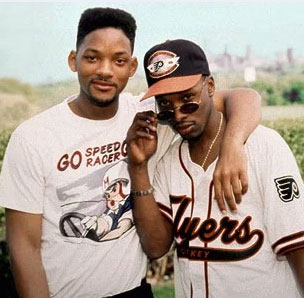 The second one is a truly bizarre case. “A Nightmare On My Street” is a DJ Jazzy Jeff & The Fresh Prince song. It was written for Nightmare on Elm Street IV, but rejected. So DJ Jazzy Jeff & The Fresh Prince wanted to release it anyway, and there was much legal wrangling. Apparently a music video in which Will Smith confronts Freddy Kreuger was shot, and then scrapped. The song itself was eventually released with a label explaining that it’s “not authorized, licensed, or affiliated with the Nightmare on Elm Street films.” It hit number 15 on the Billboard Hot 100 anyway. (This song is especially interesting in the context of the songs Will Smith would write for his own movies later, which are packed with detail from the films just like this early work.)
The second one is a truly bizarre case. “A Nightmare On My Street” is a DJ Jazzy Jeff & The Fresh Prince song. It was written for Nightmare on Elm Street IV, but rejected. So DJ Jazzy Jeff & The Fresh Prince wanted to release it anyway, and there was much legal wrangling. Apparently a music video in which Will Smith confronts Freddy Kreuger was shot, and then scrapped. The song itself was eventually released with a label explaining that it’s “not authorized, licensed, or affiliated with the Nightmare on Elm Street films.” It hit number 15 on the Billboard Hot 100 anyway. (This song is especially interesting in the context of the songs Will Smith would write for his own movies later, which are packed with detail from the films just like this early work.)
Ben Adams: An interesting version of the pop-music-version-of-in-universe song is the techno remix of the “Hanging Tree” song from Hunger Games. Which was particularly weird because it was such a 180 degree switch in tone from the in-movie version.
Richard Rosenbaum: Then there’s “Scott Pilgrim,” a song by Plumtree that inspired the name of the protagonist of the comic, and which subsequently ended up in the soundtrack of the movie adaptation.
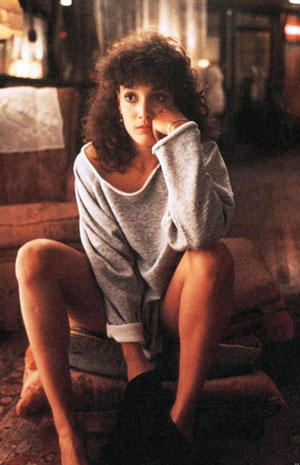 Jordan Stokes: Huh, so now I’m reading that “You’re the Best” (Karate Kid) and “Maniac” (Flashdance) were not written for the movies they appear in… But that IS the place where they were first released. You’ve gotta imagine that some retrofitting takes place in those situations. It’s not like the guy was looking for a song for Flashdance, and he just happened to pick up a random demo that’s like “She’s just a steel town girl…”
Jordan Stokes: Huh, so now I’m reading that “You’re the Best” (Karate Kid) and “Maniac” (Flashdance) were not written for the movies they appear in… But that IS the place where they were first released. You’ve gotta imagine that some retrofitting takes place in those situations. It’s not like the guy was looking for a song for Flashdance, and he just happened to pick up a random demo that’s like “She’s just a steel town girl…”
John Perich: The pop-up video trivia that I recall re: “Maniac” is that it was originally written about a literal maniac — a psycho slasher. The hard pulsing minor keys make more sense in that light.
Stokes: Another interesting special case is “Superfly,” where the album is full of songs describing specific characters and scenes from the movie, which were written for the film — and which the producers pretty much decided not to use. There’s like two minutes of music from the Superfly album in the Superfly movie. Which is kind of like the Power Rangers deciding to fight the monster of the week without using the Mega-Zord.
“Hey guys, should we use that really cool thing we have? The one that’s better than, like, ALL of the other stuff we have?”
“I’m thinking… naaaaah.”
On the music-as-fanfic front: special mention needs to be given to Kavinsky, whose entire career/persona is an elaborate homage to the Charlie Sheen vehicle The Wraith.
Sheely: Tying together a lot of where we’ve been, here’s an attempt to put some names to some of the categories that we’ve identified and to group some of our examples into these categories.
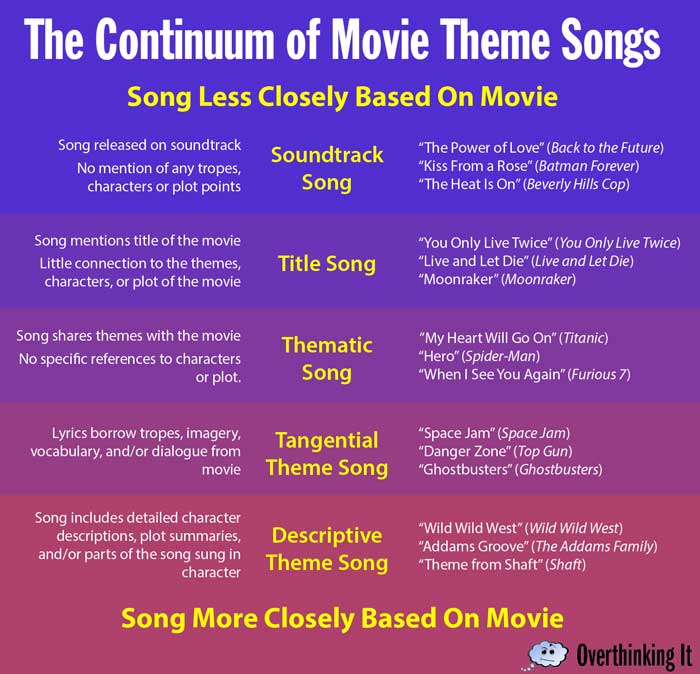
At the “less closely based on the movie” end of the spectrum, there is a phenomenon that we haven’t really talked about here: songs that just happen to be on the soundtrack and in the film, but which share little connection with the overarching themes of the movie and no connection to plot, characters, or setting. Going all the way back to Belinkie’s “Hit Songs from Obscure Movies” post, I think Eric Clapton’s “Tears in Heaven” from Rush falls into this category.
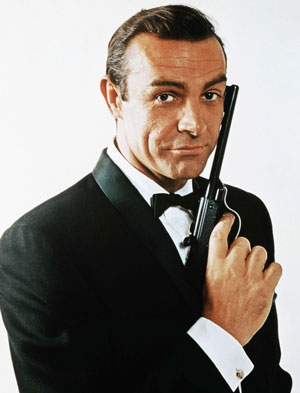
Bond songs CAN be tied to the films (“Goldfinger, he’s the man, the man with the Midas touch.”) but are just as often random riffs on the title (“You Only Live Twice or so it seems, one life for yourself and one for your dreams.”)
Songs like “Skyfall” (and most of the other Bond songs) are interesting because they share a title with the movie, but have very little either thematic or substantive overlap. In contrast, there are a lot of other “Thematic Songs” that have some thematic connection to the movie, but no explicit mention of the title, characters, plot, or setting. “My Heart Will Go On” lives here, along with a lot of the other big credits-sequence ballads like “Everything I Do” by Bryan Adams from Robin Hood or “Don’t Wanna Miss a Thing” by Aerosmith from Armageddon.
My personal favorite, “Space Jam,” goes one step further; it both mentions the title of the movie and has some overlaps in themes and genre tropes. At the same time, as Belinkie pointed out, it doesn’t really touch on the plot or characters. There a lot of other theme songs are “tangential” to the movie in this way, especially a lot of the hard cases that I brought up before like “Batdance,” “All For Love,” and “Ninja Rap.” They live in the same discursive universe as the movie, but ultimately they’re kind of not really about the movie’s plot, characters, or setting in a deeper way.
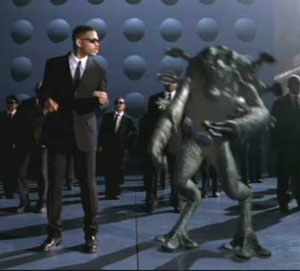 Finally, “Wild Wild West” and “Men in Black” are about those films in very literal and direct ways, in terms of setting, plot details, and connecting Will Smith’s character perspective in the films to his performance of the song. “Turtle Power,” “Monster Squad,” and “Addams Groove” are similar in that level to which they the song embedded in the world of the movie (and vice versa- they’re kind of enmeshed and stuck together like the two sides of velcro).
Finally, “Wild Wild West” and “Men in Black” are about those films in very literal and direct ways, in terms of setting, plot details, and connecting Will Smith’s character perspective in the films to his performance of the song. “Turtle Power,” “Monster Squad,” and “Addams Groove” are similar in that level to which they the song embedded in the world of the movie (and vice versa- they’re kind of enmeshed and stuck together like the two sides of velcro).
Perhaps surprisingly, the Ghostbusters song isn’t at this highest level. The song is pretty closely related to the film (referencing some specific dialogue, the title, and a lot of the genre tropes that set the context for the film), but at the same time it doesn’t reference characters or plot points in the way that “Monster Squad,” “Addams Groove,” or the Will Smith songs do.
Fenzel: Another distinction I’d make for further discussion is, assuming that it is the role of a lot of these songs to promote the movie and make people in the public sphere think it is cool, which, between the song and the movie, is the locus of coolness? This is a potential context for whether the song mentions the movie or not and how specifically.
The Ninja Turtle rap songs tend to start from the assumption that the Ninja Turtles are cool, and then make that case by showing a coolness that reflects and articulates that. Whereas for a song like “Iris” (from the Nicholas Cage weeper City of Angels) or “Hero,” the point is that the song is cool (or at least presumes to be cool), and the movie becomes cooler through association with the song.
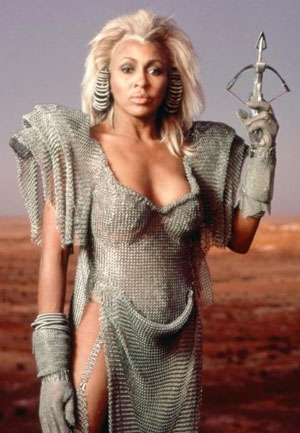 This might be why I like “We Don’t Need Another Hero” so much and find it so funny – by all rights, Tina Turner and her song are much cooler than Mad Max: Beyond Thunderdome is, and Tina Turner’s presence in the movie and on the soundtrack elevates it. But then the song’s lyrics are more in the style of “the story of Beyond Thunderdome is cool, and I’m lucky to be singing about it,” which is easy to forget, but resurfaces whenever Tina Turner says “All we want is life beyond the Thunderdome” in the song.
This might be why I like “We Don’t Need Another Hero” so much and find it so funny – by all rights, Tina Turner and her song are much cooler than Mad Max: Beyond Thunderdome is, and Tina Turner’s presence in the movie and on the soundtrack elevates it. But then the song’s lyrics are more in the style of “the story of Beyond Thunderdome is cool, and I’m lucky to be singing about it,” which is easy to forget, but resurfaces whenever Tina Turner says “All we want is life beyond the Thunderdome” in the song.
In pro wrestling terms, Mad Max: Beyond Thunderdome is getting “put over” by Tina Turner, which is hilarious and totally sweet, especially since Tina Turner’s cache and status are secure enough that she can do this without having people think less of her.
Belinkie: For those of you who aren’t down with pro wrestling, the more popular and established wrestlers are the ones who do the “putting over” of the new guys, but either losing to them or even just treating them like worthy adversaries. Wrestling fans view “putting over” as an admirable thing to do, almost like community service on the part of the established stars. So in this case it’s Tina Turner playing the role of The Rock, and Beyond Thunderdome playing the role of, I dunno, Roman Reigns or something.
Fenzel: When I think of songs like “My Heart Will Go On” or “I Don’t Want to Miss a Thing,” it makes James Cameron and Michael Bay look like sports car engineers, because even at high speeds they manage to hit 50/50 weight distribution. The coolness evenly applies to so many aspects of the project.
This might also be why songs from movie musicals don’t feel the same as theme songs from non-musicals, because there is a very small gap, if any, between the movie and the music from the movie, so one can’t really be thought to be exchanging coolness with the other.
Sheely: You don’t think there’s a coolness exchange between Celine Dion, Peabo Bryson, and Beauty and the Beast?
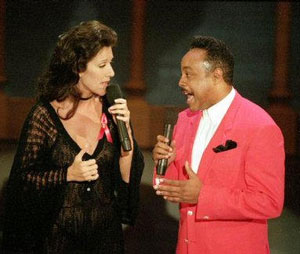 Fenzel: Hmm, to dig into it, I think there is one, but it’s tough to nail down using our criteria of content and diagesis. Stylistic difference in reprises is so key to how songs like that work – you hear it one way in the movie, and a different way on the radio or during the credits. And a bigger difference sets up a more dynamic coolness exchange, unless you’re Demi Lovato in Frozen and the Idina Menzel waveform collapses and you are eliminated from existence.
Fenzel: Hmm, to dig into it, I think there is one, but it’s tough to nail down using our criteria of content and diagesis. Stylistic difference in reprises is so key to how songs like that work – you hear it one way in the movie, and a different way on the radio or during the credits. And a bigger difference sets up a more dynamic coolness exchange, unless you’re Demi Lovato in Frozen and the Idina Menzel waveform collapses and you are eliminated from existence.
The biggest and most successful of these difference-makers I can think of is Elton John and Tim Rice with The Lion King, where the same songs, in different arrangement and style, mean totally different things in the movie, on the radio/soundtrack album, and on Broadway, and they’re all at the apex of coolness in their respective times and spaces, in dynamic coolness exchange with each other.
Sheely: That is really interesting. Whereas I think for “Beauty and the Beast” and “Whole New World” the coolness transfer is more from the movie to the pop singer. The single was actually a pop breakthrough for Celine.
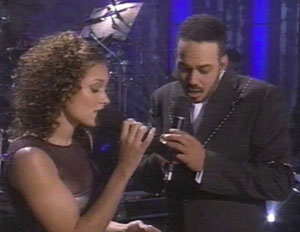 In contrast, accounts of “My Heart Will Go On” claim that Cameron was strong-armed into including the song for promotional purposes.
In contrast, accounts of “My Heart Will Go On” claim that Cameron was strong-armed into including the song for promotional purposes.
Fenzel: You could make a similar argument about Linda Rondstadt’s second or third or fourth boom, as an adult contemporary duet singer, after “Somewhere Out There” in 1987. The album she did right after that crushed it so hard that she won Grammys for it across two consecutive years.
Sheely: I’m also just struck by the fact that the Peabo Bryson/Regina Belle version of “Whole New World” hit #1 on the Billboard Hot 100 in 1992. You know what it knocked off of the number 1 spot? Another song that is relevant to this discussion but which we haven’t touched on yet.
Belinkie: And that’s a whole new category: songs that don’t refer to the movie explicitly, but are very closely linked to the movie because of the critical role they play within the film. Another good example is “Everything Is Awesome” from The Lego Movie. On our scale it’s a Thematic Song. However, it’s used in super interesting ways, both as an anthem of mindless conformity and as one of triumphant resistance. Could be that our chart needs two axes: one for the content of the song and its relevance to the film, and another for its use within the film.
So it seems like there’s more to talk about with movie theme songs (but probably not right away). Readers, any interesting cases we need to consider for next time?
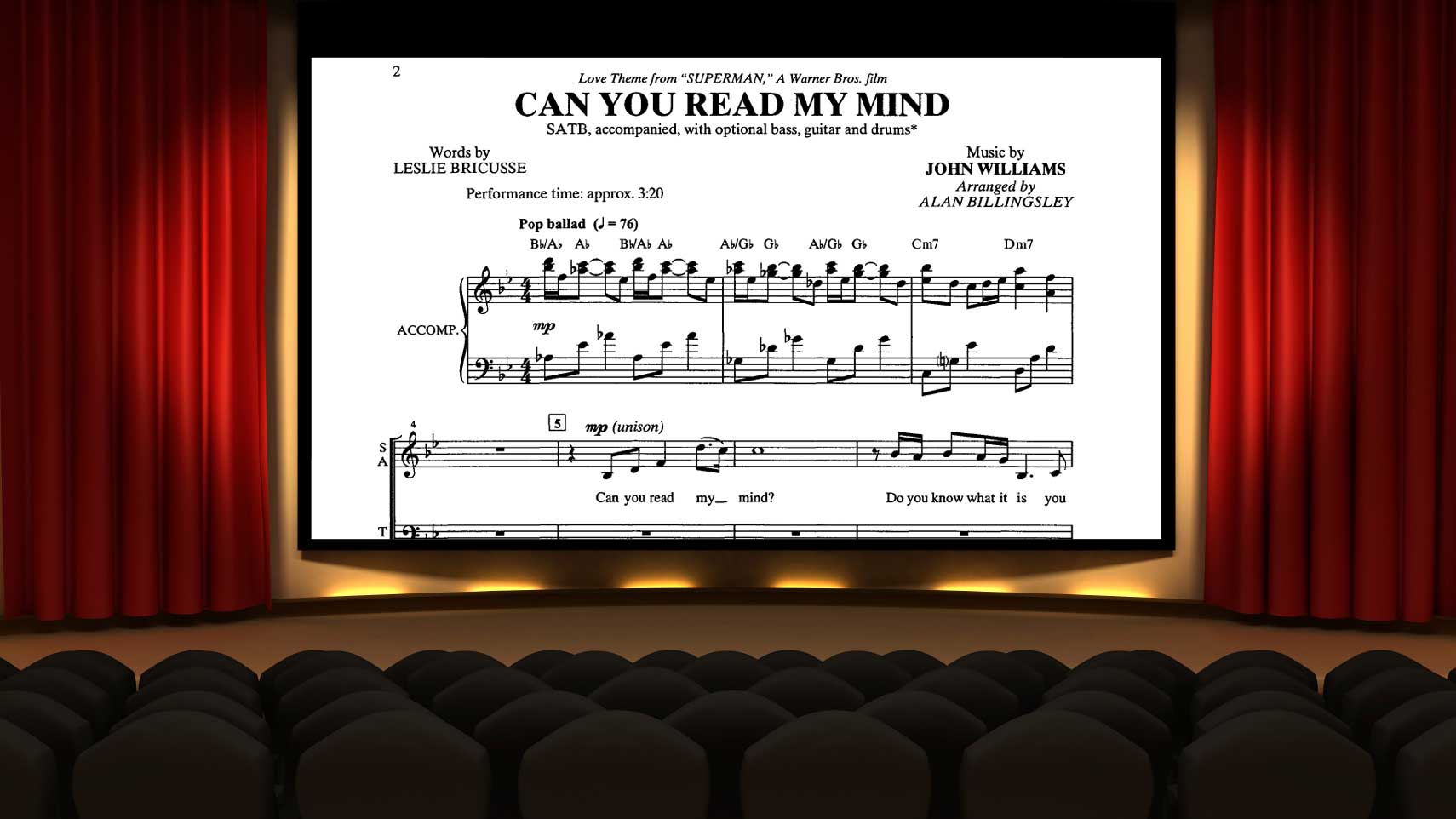
Yeah, here’s one for consideration: Weird Al Yanovic, The Saga Begins. Yes, it’s a parody song based on Don McLean’s American Pie. But it’s also an extremely accurate summary of the plot, based almost entirely on internet spoilers.
No, it’s not used in the movie at all. No, it’s not sanctioned by Lucasfilm. But it touches on a lot of the commentary in this post. It’s in a weird place of its own. It’s basically a “Descriptive Theme Song” in your categories, but done by a third party.
Perich is correct about “Maniac”. It was originally intended to be about psycho killer.
“He’s a maniac, he’s a maniac, he will kill your cat and nail it to the door” was the main lyrics. Todd in the Shadows does a One Hit Wonder youtube series that addresses the backstory of Maniac. The guy who wrote the theme also tackled “Gremlins” and “Cocoon”.